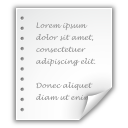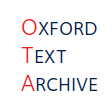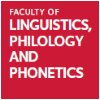Excerpts from classical Latin texts
| dc.contributor | Oxford Text Archive |
| dc.date.accessioned | 2018-07-27 |
| dc.date.accessioned | 2022-08-21T16:31:02Z |
| dc.date.available | 2022-08-21T16:31:02Z |
| dc.date.created | unknown |
| dc.identifier | ota:1012 |
| dc.identifier.uri | http://hdl.handle.net/20.500.14106/1012 |
| dc.description.abstract | There are two versions of the text, with one small textual variant, and no documentation. Contents: Catullus. Carmina. 3, 46, 84, 101 ; Horace. Odes. Liber III. 9, 11 (lines 25-52) ; Ovid. Metamorphoses. Liber VIII. Daedalus et Icarus (lines 183-235) ; Ovid. Fasti. Liber I. lines 543-582 ; Virgil. Aeneid. Liber III. lines 588, 590-620, 622-640, 643-670, 672-683 ; Martial. Epigrammaton. Liber I. 86 ; Liber X. 23, 32 This text was originally produced in conjunction with an old 'O'-level Latin course. The excerpts (nearly all poems) could be useful for current pupils wanting more practice in translating fresh passages of Latin in preparation for examinations Catullus, Gaius Valerius Horace Ovid, 43 B.C.-17 or 18 A.D. Virgil Martial |
| dc.format.extent | Text data (1 file : ca. 12.5 KB) |
| dc.format.medium | Digital bitstream |
| dc.language | Latin |
| dc.language.iso | lat |
| dc.publisher | University of Oxford |
| dc.relation.ispartof | Oxford Text Archive Legacy Collection |
| dc.rights | Distributed by the University of Oxford under a Creative Commons Attribution-NonCommercial-ShareAlike 3.0 Unported License. |
| dc.rights.uri | http://creativecommons.org/licenses/by-nc-sa/3.0/ |
| dc.rights.label | PUB |
| dc.subject.lcsh | Poems -- Italy -- B.C. |
| dc.subject.lcsh | Poems -- Italy -- 1st-5th century period |
| dc.subject.lcsh | Epigrams -- Italy -- 1st-5th century period |
| dc.subject.lcsh | Anthologies |
| dc.title | Excerpts from classical Latin texts |
| dc.type | Text |
| has.files | yes |
| branding | Oxford Text Archive |
| files.size | 13328 |
| files.count | 1 |
This item is
Attribution-NonCommercial-ShareAlike 3.0 Unported (CC BY-NC-SA 3.0)
Publicly Available
and licensed under:Attribution-NonCommercial-ShareAlike 3.0 Unported (CC BY-NC-SA 3.0)
Files for this item

- Name
- olat-1012.txt
- Size
- 13.02 KB
- Format
- Text file
- Description
- Version of the work in plain text format
<A LATIN> <P CATULLUS> <W CARMINA> <S 3> <L 1> LUGETE, O $VENERES $CUPIDINES-QUE, ET QUANTUM EST HOMINUM VENUSTIORUM. PASSER MORTUUS EST MEAE PUELLAE, PASSER, DELICIAE MEAE PUELLAE, QUEM PLUS ILLA OCULIS SUIS AMABAT. NAM MELLITUS ERAT SUAM-QUE NORAT IPSAM TAM BENE QUAM PUELLA MATREM, NEC SESE A GREMIO ILLIUS MOVEBAT, SED CIRCUMSILIENS MODO HUC MODO ILLUC AD SOLAM DOMINAM USQUE PIPIABAT. QUI NUNC IT PER ITER TENEBRICOSUM ILLUD, UNDE NEGANT REDIRE QUEMQUAM. AT VOBIS MALE SIT, MALAE TENEBRAE $ORCI, QUAE OMNIA BELLA DEVORATIS: TAM BELLUM MIHI PASSEREM ABSTULISTIS. O FACTUM MALE. O MISELLE PASSER, TUA NUNC OPERA MEAE PUELLAE FLENDO TURGIDULI RUBENT OCELLI. <S 46> <L 1> IAM VER EGELIDOS REFERT TEPORES, IAM CAELI FUROR AEQUINOCTIALIS IUCUNDIS $ZEPHYRI SILESCIT AUREIS. LINQUANTUR $PHRYGII, $CATULLE, CAMPI $NICAEAE-QUE AGER UBER AESTUOSAE: AD CLARAS $ASIAE VOLEMUS URBES. IAM MENS PRAETREPIDANS AVET VAGARI IAM LAETI STUDIO PEDES VIGESCUNT. O DULCES COMITUM VALETE . . .




